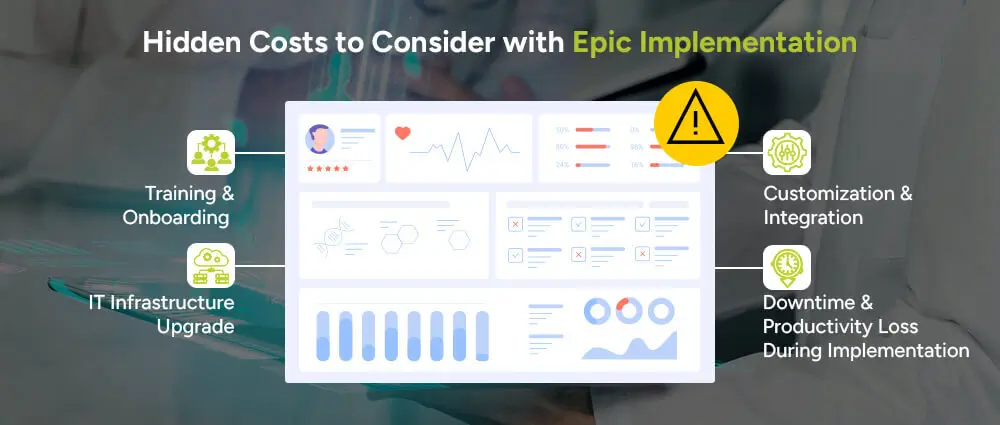If you’ve ever wondered how much does Epic cost in 2025, especially in Europe, you’re not alone. Whether you’re a healthcare provider, a hospital administrator, or just someone curious about healthcare tech, Epic has probably popped up on your radar.
But before we dive into the cost side of things, let’s take a step back, what exactly is Epic, and why is it such a big deal?
Epic Systems is one of the biggest names when it comes to healthcare software. They offer electronic health records (EHRs), medical billing tools, patient engagement apps, basically everything a healthcare provider might need to keep patient information organized and secure.
Whether you hear people asking how much does Epic EMR cost, or how much does Epic medical software cost, they’re all talking about this same ecosystem of tools that power some of the world’s best hospitals and clinics.
Epic is widely praised for how smoothly it connects different parts of the patient experience. From the moment you walk into a clinic to the follow-up email you get after a surgery, Epic can power it all behind the scenes. Pretty cool, right?
In my opinion, one of Epic’s biggest strengths is how scalable it is. A large hospital group and a small private practice can both find value in using it (though the setup would obviously look a little different).
It is also equipped with features such as telehealth, patient portals, advanced analytics, and even AI recommendations for doctors. A lot of people are curious: How much does Epic cost for a hospital? How much are Epic EHR monthly fees? Such is the capacity of the software that many feel it should be worth the investment.
Now, let’s talk a little bit about the cost side, without drowning in too many numbers.

First, it’s important to know that Epic doesn’t really have a one-size-fits-all price. It depends on factors like the size of your practice, the number of users, and how complex your needs are. That’s why you’ll often hear questions like how much does Epic cost for a clinic versus how much does Epic cost hospital, because they can be very different!
In Europe in 2025, Epic pricing still follows the general trend of being a premium option.
You’re typically looking at a multi-million euro investment, but again, this covers the software, licensing, and often a lot of training and support too. You are also obligated to follow certain protocol and be HIPAA compliant cloud storage for healthcare Professionals.
You’ll still find that Epic is one of the more expensive options. People searching how much does Epic cost for a small clinic or how much does Epic cost for a private practice will find that costs can be relatively high compared to more lightweight solutions.
If you’re wondering how much does Epic EHR cost per month, it usually isn’t billed monthly the way some subscription services are. Most agreements are long-term, often structured around yearly licensing and support.
In short: Epic tends to be a significant but long-term investment, particularly favored by institutions that want a comprehensive, reliable system.
You might have heard about other Epic products like Epic Universe, their next-gen platform integrating even more patient services, AI, and mobile support. So if you’re asking how much does Epic Universe cost, just know it’s currently bundled into broader service agreements and remains a premium offering in 2025.
Several factors affect how much Epic software costs:
Implementation support: Epic often requires dedicated consultants for setup, training, and optimization.
Ongoing support and maintenance: Regular updates and helpdesk services are usually part of a service contract.

When evaluating Epic for your healthcare organization, it’s crucial to recognize that the initial sticker price is just the beginning. There are several hidden costs that can significantly impact your budget and planning. Here are some important “gotchas” to keep in mind:
Training properly is vital to the success of an Epic rollout, but it can prove extravagant. In my opinion, organizations often underestimate this cost. Training and onboarding costs can easily be beyond €100,000 depending on the size of the staff, while big hospitals or healthcare systems can spend much, much more. This includes initial and ongoing training, costs for trainers, development of custom training materials, certification programs for key users, and need for refresher courses as time passes and the system changes.
Epic’s software is quite heavy in its performance and resource usage. Your current infrastructure such as IT, servers, storage, cloud, healthcare IT Support Services, and network bandwidth may require a huge makeover to meet Epic’s performance and security requirements. In my opinion, this can be a hidden iceberg: hardware, cloud service, cybersecurity solutions, and IT staff expansion costs wind up tacking on hundreds of thousands more to the total cost of the project.
It is flexible, yet costly to make hidden costs known in the integration of other existing laboratory systems, imaging equipment, Patient portal software, billing systems, insurance portals, and outside applications. Usually, this involves engaging a consultant with specialized knowledge, middleware solution, and extensive testing, thus greatly increasing the total cost of the project. Without careful budgeting for the taking up of costs due to integration, it may become a much greater cause for delay and budget overruns than you have ever seen.
There will be a learning curve no matter how much you prepare for the change to Epic. Your staff will be productively spending time with new workflows and away from patient appointments and, therefore, it will reduce productivity in the short term. Some partial downtime may occur on the system while migrations or updates are in effect, thus further temporarily disrupting operations. Even in my view, therefore, one must plan for a period of reduced operational efficiency, stretching at least to several months, and assign additional resources to help bridge the gap.
Honestly? It depends on what you need. Epic is like the Mercedes-Benz of EHR systems. It’s sleek, powerful, and made for serious healthcare players. But if you’re a small practice just starting out, it might be like buying a Ferrari to drive to the grocery store.
That’s why when you hear people ask things like how much does Epic cost per year or how much does Epic Systems cost, it’s so variable. It’s almost like asking, “how much does a car cost?”, it depends on the model, the features, and the size.
In the end, when asking how much does Epic cost, it’s really about asking how much you’re willing to invest in a long-term healthcare solution and medical practice IT support. It’s not cheap, but it’s designed to be powerful, secure, and future-proof. So, get the expertise of software developers and IT support staff at Arpatech to get the best software update for your healthcare system.
Implementation costs for Epic in a hospital can easily reach into the millions of euros. It includes licensing, infrastructure, training, customization, and support. Big hospitals often see this as a necessary long-term investment to provide top-tier patient care.
For general EMR systems (not just Epic), costs can range widely, from a few thousand euros a year for basic setups, to millions for enterprise-grade solutions like Epic. Cloud-based EMRs tend to be more affordable upfront compared to on-premise giants.